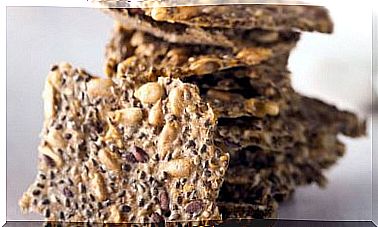Looking For A Baby? Boost Your Fertility With These Nutrients
A diet rich in vitamins and antioxidants is essential in the holistic treatment of fertility. You will find them in natural foods and supplements.

Improving your diet and that of your partner is one of the things you can do to increase the chances of pregnancy. The nutrients and antioxidant compounds found in plant foods will help you balance the complex gear of hormones that participate in fertility and, in general, prepare your body for pregnancy.
A good strategy is to increase your intake of green leafy vegetables, seasonal fruits, legumes, seeds, unroasted nuts, quality oils, whole grains, and water. But there are also some recommendations related to specific nutrients.
Group B vitamins to avoid problems
When we change our diet to optimize our fertility, we must make sure that we do not lack B vitamins, especially B6, B12 and folic acid (B9).
It has been shown that the increase of B vitamins in the diet helps prevent miscarriages related to high levels of homocysteine, an amino acid found in our body and whose concentration in the blood is precisely regulated by the B vitamins (especially B12).
When these vitamins are in short supply, homocysteine levels become unbalanced, which can lead to miscarriages or pregnancy complications such as placental abruption or pre-eclampsia.
B12 vitamin
B12 deficiency can also cause irregular ovulations and even stop it altogether. A good supplementation of B12 in men is reflected in the quality and production of sperm. In women it helps to build a cozy lining of the endometrium, which decreases the chances of miscarriage.
• Recommended dose: 25-100 mcg in daily supplementation or 2,000 mcg if taken weekly.
Vitamin B6
Vitamin B6 helps the body synthesize serotonin and is key to reducing many of the symptoms associated with female PMS. When we are deficient in this vitamin, we can experience mood swings and irritability.
Numerous studies prove that supplementing with B6 can be useful to treat the reproductive health problems of many women, since it is essential for the formation of the prostaglandins involved in the hormonal balance of the last phase of the menstrual cycle.
B6 is found in oats, brown rice, corn, legumes, bananas, nutritional yeast, brewer’s yeast, avocado, seeds, and oleaginous fruits.
• Recommended dose: 25 mg in case of deficit.
Folic acid or vitamin B9
It prevents malformations at the beginning of pregnancy and recent studies affirm that it can be essential at the time of conception.
The World Health Organization insists on starting to take it between 3 and 6 months before conception, to ensure that its levels are sufficient in the first weeks of pregnancy and prevent possible alterations.
The most abundant sources are green leafy vegetables, brewer’s yeast, nutritional yeast, legumes, sprouts, and fruits.
• Recommended dose: 400-600 mg / day in all cases.
The most important nutrients for man
The male factor is the other 50% in the fertility equation. The quality of the sperm reflects what the man has eaten and the supplements he has taken 42 to 76 days before. So the changes made today in diet or taking supplements will actually have an effect on the sperm that travels to meet the egg within two months.
Zinc and selenium dosage
An increase in these minerals improves the quantity and quality of sperm, and protects the DNA structure from damage caused by free radicals. Men with low sperm counts also usually have low levels of zinc and selenium.
For this reason, it is advisable to include in the diet: unroasted oil seeds and fruits such as sesame, walnuts, Brazil nuts, almonds and pumpkin seeds, or legumes such as lentils, black beans or peas, and garlic, asparagus, mushrooms and mushrooms.
• Recommended dose of zinc: 20 mg / day, for zinc (30 mg if the man is vegan), without exceeding 40 mg / day, since it can decrease fertility.
• Recommended dose of selenium: 70 mcg / day.
Antioxidants
Oral antioxidant supplementation such as vitamins A, C, and E, coenzyme Q10, and L-carnitine improves sperm quality and pregnancy rates when fertility is low. Combined with a diet rich in fruits and vegetables, it can make a difference when looking for a baby.
The 6 hormones to consider if you want a pregnancy
Knowing what your menstrual cycle is like is knowing yourself a little more. Therefore, if you want to enhance your fertility, the first thing you should do is observe your body, because it speaks to you through its phases and expresses the needs or deficiencies that you may have.
The phases of the cycle are governed by hormones. The menstrual cycle is a dance of hormones and neurotransmitters that fluctuate from month to month and influence the way we feel, modulate our way of relating to our surroundings and, of course, regulate our fertility.
Estrogens
They are the best known female hormones and their balance is vital for a healthy menstrual cycle. They have a fundamental role in reproductive health and are the cause of the physical and emotional renewal that we perceive after menstruation. They are also essential for the formation of our bones and cholesterol levels.
Luteinizing hormone
It is produced in the pituitary during the first phase of the menstrual cycle and stimulates the growth of follicles and the maturation of the ovum. After ovulation, luteinizing hormone (LH) stimulates the corpus luteum (the follicle that was left empty) to produce progesterone.
Follicle Stimulating Hormone
It is also produced in the pituitary gland and regulates the function of the ovaries. As with LH, its levels fluctuate throughout the cycle, with the highest peak in the ovulatory phase. It stimulates the growth of follicles inside the ovary and modulates the production of estrogens.
Antimullerian hormone
It is produced by the follicles inside the ovaries, and age and lifestyle can influence its levels. In assisted reproduction treatments, it is usually measured by blood tests, since high levels of this hormone indicate that there is a greater probability of obtaining good results.
Progesterone
It is released by the corpus luteum after ovulation and prepares the uterus for possible fertilization, thickening the endometrium (lining of the uterus) and stimulating its vascularization, so that, in the event of a pregnancy, the embryo can implant and nourish itself.
Prolactin
It stimulates the female body to make milk after childbirth and is part of the hormones that influence fertility. Very high levels lead to alterations in the menstrual cycle, anovulatory cycles, infertility and even milk secretion in women who are not pregnant or breastfeeding a baby.
Keep a fertility journal
Changes in vaginal discharge give us clues to the phase change so that we can determine what the fertile days will be.
After menstruation we go through a dry phase (follicular or pre-ovulatory) that becomes more humid as ovulation approaches. The action of estrogens makes the flow resemble the texture of egg white. This is the clearest indicator that you are entering the fertile phase.
Control vaginal temperature
Vaginal temperature is another important factor to observe, since during the first phase of the cycle it is lower (between 36 and 36.7 ° C) and after ovulation (around day 13 or 14 of the cycle) it increases progressively between 0.3 and 1 ° C above our normal temperature due to the action of progesterone.
The fertile days are those immediately prior to that increase in temperature.
When menstruation occurs, progesterone and temperature drop again, although if a pregnancy had occurred, both would remain elevated.
End of the fertile phase
After the ovulatory phase, the vaginal discharge becomes thick again and even disappears when we enter the premenstrual phase, where another hormone, progesterone, acts. This phase leads us back to menstrual bleeding and so on cyclically.
Start by differentiating the different phases, especially ovulatory and menstrual, and write in a journal how you are doing in each one. Check if your period arrives on time or if it varies a lot from one month to another.
Observe and note if the bleeding is very heavy, if you feel pain one day of the cycle or if you have more appetite for a food, since it can be a clue that the body needs a specific nutrient.









